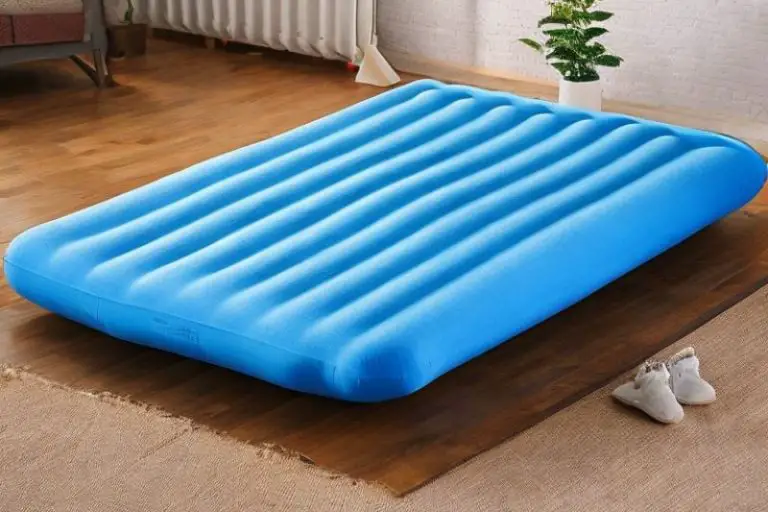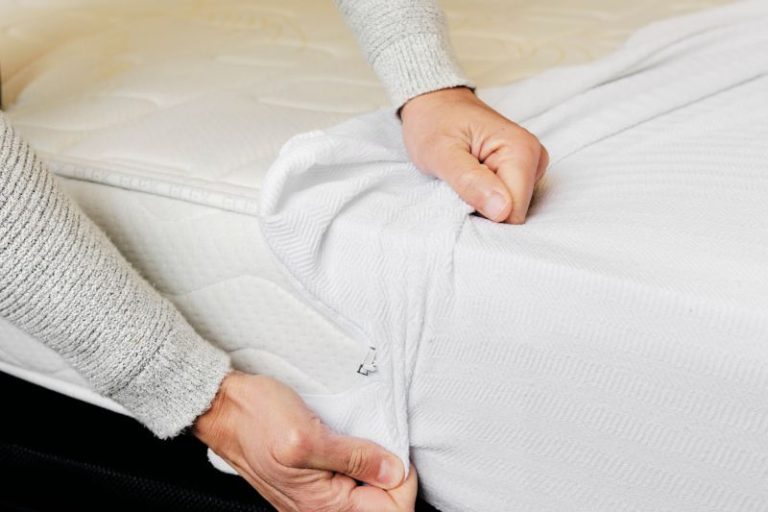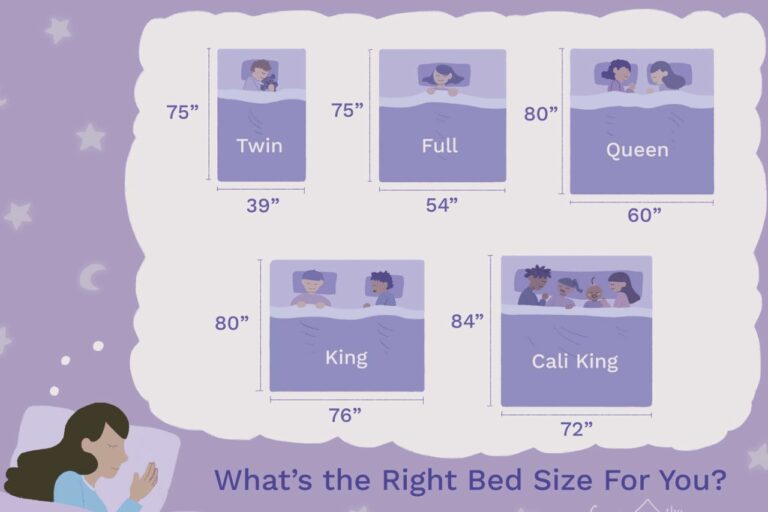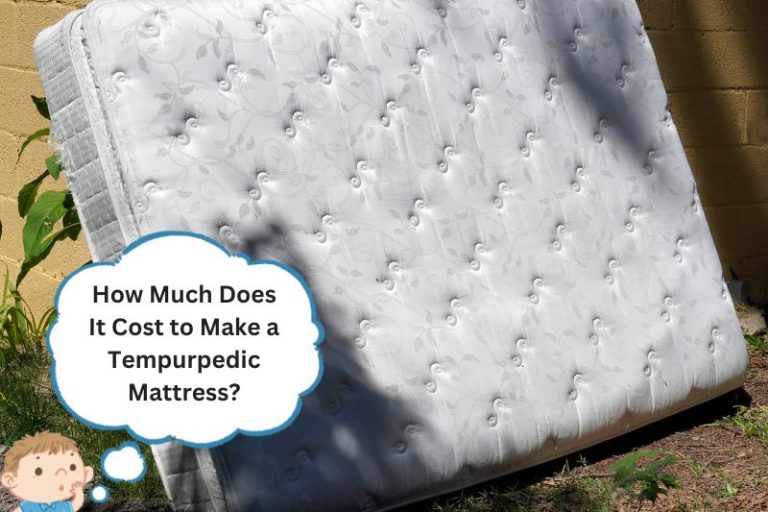Why Is My Sleep Number Bed So Uncomfortable? (Tips!)

If you own a Sleep Number bed, you know that the ability to customize your mattress to your desired firmness is one of the main selling points.
However, what do you do if your Sleep Number bed is suddenly uncomfortable?
Before jumping to the conclusion that your bed has a defect, there are a few factors to consider that may be contributing to your discomfort.
Why Is My Sleep Number Bed So Uncomfortable?
Sleep Number beds have received complaints regarding discomfort. Users have reported issues such as frequent deflation and a feeling of it being similar to an air mattress. Additionally, certain models lack a cushioned mattress pad, resulting in a firmer feel.
One of the primary reasons for discomfort in a Sleep Number bed is an incorrect or outdated setting on the bed’s air pump.
Over time, your preferred level of firmness may change, or perhaps you or your partner have gained or lost weight.
It’s essential to adjust the air pressure accordingly to ensure that the mattress is providing the optimal amount of support for your body.
Another factor to consider is the age of your mattress. If your bed is more than eight years old, it may be time to replace it.
Over time, the materials in your bed can break down, contributing to an uneven and uncomfortable sleeping surface.
It’s also worth mentioning that what may feel like discomfort in your Sleep Number bed may actually be due to other factors, such as the temperature of your room, the quality of your bedding, or even your own stress levels.
While adjusting the settings on your bed or replacing your mattress may help, it’s important to evaluate all aspects of your sleep environment to ensure that you’re getting the best possible night’s sleep.
7 Reasons Your Sleep Number Bed Might Be Uncomfortable:
If you have a Sleep Number bed, but you’re not getting the comfortable sleep you were expecting, there could be a number of reasons why.
Here are seven common reasons why your Sleep Number bed might be uncomfortable:
- Your Sleep Number setting isn’t right for you. Your Sleep Number setting is the level of firmness or softness that feels most comfortable to you. If your Sleep Number setting is too low or too high, it can cause you to feel uncomfortable during the night. You might need to adjust your Sleep Number setting to find the perfect firmness level.
- Your mattress is too old. Over time, mattresses can lose their shape and support, making them uncomfortable to sleep on. If your Sleep Number bed is more than eight years old, it might be time to consider getting a new mattress.
- Your mattress is too soft. If your mattress is too soft, it can cause you to sink in too much, which can lead to discomfort. This can be due to the age or quality of the foam layers, in case of Sleep Number.
- Your pillow is too flat or too thick. The wrong pillow can make it difficult to get comfortable, no matter how soft or firm your mattress is. If your pillow is too flat or too thick, it can cause discomfort in your neck and shoulders.
- You’re sleeping in the wrong position. Different sleeping positions require different levels of support. If you’re sleeping in the wrong position for your body type or needs, it can cause discomfort during the night.
- You’re not using the right accessories. Sleep Number beds come with a variety of accessories, including mattress pads and mattress toppers. If you’re not using the right accessories for your needs, it can lead to discomfort during the night.
- Your bed base is not sturdy enough. If your bed base is not sturdy enough, it can cause your Sleep Number bed to sag or shift during the night. This can lead to discomfort and poor sleep quality. Make sure your bed base is strong and supportive enough to properly hold your Sleep Number bed.
By addressing these seven common issues, you can help ensure that your Sleep Number bed is as comfortable as possible, allowing you to get the restful sleep you need to feel your best.
Is Your Sleep Number Bed Too Firm?
If you find your Sleep Number bed uncomfortable, one of the reasons could be that it is too firm.
Here are some signs that your bed may be too firm:
- You wake up with body aches and pains
- You feel like you are sleeping on a hard surface
- You have trouble getting comfortable and sleeping through the night
- You experience pressure points on your body, such as your hips, shoulders, and knees
If you have experienced any of these symptoms, you might want to adjust the firmness setting of your Sleep Number bed.
The ideal firmness level will vary from person to person, based on factors such as your weight, body shape, and sleeping position.
To determine the right firmness level for you, try adjusting the bed’s setting gradually.
Start by reducing the firmness by a few points, and see if that makes a difference.
If it doesn’t, adjust it again until you find the perfect level.
Remember that it may take some time to find the right firmness setting, so be patient and keep experimenting until you find what works for you.
Remember, a Sleep Number bed is designed to be adjustable and customizable to your specific comfort needs.
If your bed is not comfortable, it’s likely due to an incorrect firmness setting.
By adjusting the bed’s setting and being patient, you can enjoy a restful and comfortable night’s sleep.
| Sign | Possible Reason |
|---|---|
| Body aches and pains | The bed is too firm, causing pressure on the muscles and joints |
| Feeling like you are sleeping on a hard surface | The surface is too hard and not contouring to your body |
| Trouble getting comfortable | The mattress is not providing proper support or pressure relief |
| Pressure points on your body | The bed is not properly aligning with your body’s natural curves and causing undue pressure |
Is Your Sleep Number Bed Too Soft?
If you have a Sleep Number bed that feels too soft, there are several factors to consider:
- Check your Sleep Number setting: is it set too low? If so, try increasing it by 10 points and see if that improves the comfort level.
- Is your mattress pad too thick? Thick mattress pads can interfere with the contouring effect of the Sleep Number bed and make it feel too soft.
- Are you using the right type of sheets? 100% cotton or bamboo sheets tend to be cooler and better at wicking away moisture, which can help you feel more comfortable in bed.
- Is your bed foundation providing enough support? A sagging foundation can cause the mattress to feel too soft.
- Have you checked for leaks or damage in your Sleep Number mattress? If there’s a problem with the air chambers, your bed may feel too soft or uneven.
If none of the above factors apply, you may need to consider changing your Sleep Number mattress model or type. It’s also important to keep in mind that individual preferences and needs can vary, so what might be too soft for one person might be just right for someone else.
Uneven Comfort Setting on Your Sleep Number Bed:
An uneven comfort setting is a common issue that can cause discomfort on your sleep number bed.
This problem can happen due to several reasons, such as:
- The bed is placed on an uneven surface that causes the bed to tilt.
- The air chambers are unbalanced and not properly set up.
- The firmness setting is incorrect, causing one side of the bed to feel firmer or softer than the other side.
If you’re experiencing an uneven comfort setting, follow these steps to troubleshoot the issue:
- Check the surface where your bed is placed. Ensure that it is level and free of any bumps or dips.
- Check the air chambers to make sure they are balanced. Use your bed’s remote control to adjust the settings. To check for balance, lie on different sides of the bed and see if you feel a difference.
- Adjust the firmness setting. If you feel like one side of the bed is firmer or softer than the other, adjust the settings on your bed’s remote control to even it out.
- If these steps don’t solve the issue, contact Sleep Number’s customer service for further assistance.
Ensuring that your Sleep Number bed is set up correctly and on a level surface can help you avoid an uneven comfort setting and get a good night’s sleep.
Worn-Out Foam or Air Chambers in Your Sleep Number Bed:
If you notice that your Sleep Number bed has become uncomfortable, it may be due to worn-out foam or air chambers that need to be replaced.
Here are a few things to consider:
Foam Deterioration:
Sleep Number beds come with foam padding that lines the inside of the mattress cover.
Over time, this foam can deteriorate, leading to discomfort and poor sleep quality.
Symptoms of foam deterioration include:
- Sagging or dipping in the middle of the bed
- Lumps or bumps in the foam
- Uneven support
- Reduced pressure relief
Air Chamber Problems:
Another reason your Sleep Number bed may be uncomfortable is due to problems with the air chambers.
Here are some potential issues to consider:
- Air leaks: if your bed constantly loses air, it could be due to a punctured air chamber.
- Misaligned chamber: if you feel like you are constantly struggling to find a comfortable position, it could be due to a misaligned air chamber.
- Broken pump: if your pump is not inflating your bed thoroughly or at all, it could be time for a replacement.
How to Fix the Issue?
If you suspect that the foam or air chambers in your Sleep Number bed are the cause of discomfort, you can take some steps to fix the issue:
- Contact Sleep Number customer service to order replacement foam or air chambers.
- Consider upgrading to a newer model bed with improved foam or air chamber materials.
- Regularly maintain and clean your bed to prevent future wear and tear. In summary, worn-out foam or air chambers can cause uncomfortable sleep in your Sleep Number bed. Look for signs of deterioration like sagging, dipping, or lumps and bumps in your foam. Air chamber problems like leaks, misalignment, or faulty pumps are also potential causes. To address the issue, contact Sleep Number customer service to order a replacement or consider upgrading to a newer model bed.
Are Your Pillows and Bedding Affecting Your Sleep Number Bed?
Your pillows and bedding play an essential role in determining the comfort level of your Sleep Number bed.
Here are a few factors that could be affecting your comfort level:
- Pillow type: The type of pillow you use could be causing discomfort. If your pillow is too high or too low, it can lead to neck pain, which can affect the quality of your sleep.
- Pillow condition: Over time, pillows lose their shape and support. If your pillow is lumpy or flat, it can cause discomfort and affect your overall sleep quality.
- Bedding material: The material of your bedding can also play a role in your sleep comfort. If you’re too hot or too cold, it can affect your sleep quality. Make sure to choose bedding materials that match your sleep preferences.
- Bedding quality: A high-quality bedding set can promote better sleep quality by regulating temperature and moisture and preventing allergens.
- Washing frequency: Regular washing of your pillows and bedding can help remove allergens, dirt, and bacteria, improving your overall sleep hygiene.
- Bedding fit: Ensure that your bedding fits correctly on your Sleep Number bed. If the sheets or comforter are too big or too small, they can shift during the night and leave you tangled up.
Take note of these crucial factors, and make sure to keep your pillows and bedding clean and well-maintained for optimal sleep comfort.
| Statistic | Data |
|---|---|
| Percentage of people who experience neck pain from improper pillow use | 25% |
| Average lifespan of a pillow | 18-36 months |
| Optimal room temperature for sleep | 60-67°F (15-19°C) |
| Recommended washing frequency for pillows and bedding | Every two weeks |
Poor Sleep Hygiene and Your Sleep Number Bed:
Having a Sleep Number Bed that feels uncomfortable is definitely frustrating, but before you blame the bed itself, it’s important to consider your sleep hygiene habits.
How Your Habits Can Affect Your Sleep Experience?
- Eating and Drinking Habits: Eating heavy meals or drinking caffeine or alcohol close to bedtime can make it harder for you to fall asleep, and can even disrupt the quality of your sleep. It’s best to eat and drink at least a few hours before getting into bed.
- Screen Time: Using your phone, tablet, or computer in bed can wreak havoc on your sleep. The blue light from electronic devices suppresses melatonin and can make it harder for you to feel sleepy. Try to avoid screens for at least an hour before bed.
- Sleep Schedule: Going to bed and waking up at different times each day can throw your circadian rhythm out of whack, making it harder for you to fall asleep and wake up feeling refreshed. Aim to keep a consistent sleep schedule, even on weekends.
How These Habits Can Affect Your Sleep Number Bed?
- Adjustment Period: When you first get a Sleep Number Bed, it can take a little while for your body to fully adjust. If you haven’t given yourself enough time to get used to the bed, you may experience discomfort that’s actually due to your own sleep habits rather than the bed itself.
- Inability to Relax: If you’re feeling stressed or anxious before bed, it can be difficult to relax and get comfortable in any bed, including a Sleep Number Bed. Incorporating relaxation techniques or practicing mindfulness before bed may help you feel more at ease.
- Body Tension: If you carry tension in your body, such as in your shoulders or back, it can cause discomfort while you’re sleeping. Stretching, yoga, or massage therapy may help release some of this tension and improve your sleep experience.
In short, poor sleep hygiene habits can impact how comfortable you feel on your Sleep Number Bed. By improving your sleep routine, you may find that you’re able to get a better night’s sleep and make the most out of your bed.
When to Replace Your Sleep Number Bed?
While Sleep Number beds are known for their durability, there comes a time when you need to replace them to avoid discomfort and lack of support.
Here are some signs that indicate it may be time to replace your Sleep Number bed:
- Sagging: If you notice a visible sag or dent in the center or sides of your mattress, it means that the foam or air chamber has worn out and is no longer providing sufficient support.
- Worn-Out Cover: If the cover of your Sleep Number bed is ripped, torn, or stained, it can affect the overall look and feel of your bed. Sleep Number offers replacement covers, but if you’re constantly replacing them, it may be time to buy a new bed.
- Loss of Firmness: Over time, the foam or air chambers of your bed may lose firmness or support which can lead to an uncomfortable sleeping experience.
- Age: The average lifespan of a Sleep Number bed is about 8-10 years. If your bed is older than this, it may be time to consider a replacement.
- Changes in Your Sleep: If you find that you’re not sleeping as well as you used to on your Sleep Number bed, it’s possible that it has lost its support and needs to be replaced.
Replacing your Sleep Number bed may seem like a significant expense, but it’s an investment in your sleep and overall health. A new bed can provide improved support, comfort, and a better night’s sleep.
| Signs it’s time to replace your Sleep Number bed |
|---|
| Visible sag or dent in the mattress |
| Worn-out cover |
| Loss of firmness |
| Age of the bed |
| Changes in your sleep |
Expert Tips to Make Your Sleep Number Bed More Comfortable:
If you’re finding your Sleep Number bed uncomfortable, don’t worry because there are solutions that can help you sleep better.
Here are some tips that can make your Sleep Number bed more comfortable and improve your overall sleep quality.
1. Adjust Your Sleep Number Settings:
One of the most important things that you can do to make your Sleep Number bed more comfortable is to adjust your Sleep Number settings.
Make sure that your personalized Sleep Number setting is set to your preferred level of firmness.
You can experiment with different settings until you find the perfect one that suits your body’s needs.
2. Use a Quality Mattress Topper:
A high-quality mattress topper can provide an extra layer of comfort to your Sleep Number bed.
Consider using a memory foam topper that conforms to your body shape and reduces pressure points.
A natural wool topper can also provide a soft and comfortable surface to sleep on.
3. Invest In Quality Pillows:
Investing in quality pillows is another way to improve your Sleep Number bed’s comfort level.
Look for pillows that provide adequate support for your neck, shoulders, and head to ensure you wake up feeling refreshed.
4. Use Quality Bedding:
Using high-quality bedding can make a big difference in how comfortable your Sleep Number bed feels.
Choose sheets with a high thread count and a soft texture that can add to the luxurious and comfortable feeling of your bed.
5. Keep Your Bed Clean:
Maintaining a clean and hygienic bed is essential for a comfortable sleep experience.
Remember to vacuum your bed and wash your bedding regularly to prevent buildup of dirt, dust, and allergens.
By following these tips, you can significantly improve the overall comfort of your Sleep Number bed and get a better night’s sleep.
Conclusion: Why Is My Sleep Number Bed So Uncomfortable?
In conclusion, if you’re experiencing discomfort with your Sleep Number bed, there are several steps you can take to improve your sleep quality and comfort:
- Adjust your Sleep Number setting: Experiment with different settings to find the optimal level of firmness for your body type and sleeping preferences. Remember to adjust the setting based on changes in weight or sleeping habits.
- Check your mattress pad and sheets: Make sure your bedding is compatible with your Sleep Number bed, and that your mattress pad is not too thick or lumpy, as this can affect the bed’s ability to conform to your body.
- Address any underlying health issues: If you are experiencing chronic pain or other health issues that may be affecting your sleep, consult with a healthcare provider to address these issues.
By taking these steps, you can enhance your sleep experience and enjoy the benefits of a good night’s sleep. Remember, a comfortable and supportive bed is essential for recharging your body and mind for the day ahead.






